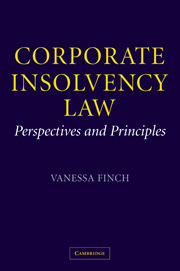Book contents
- Frontmatter
- Contents
- Acknowledgements
- Table of cases
- Table of statutes and other instruments
- List of abbreviations
- Introduction
- Part I Agendas and objectives
- Part II The context of corporate insolvency law: financial and institutional
- Part III The quest for turnaround
- 6 Rescue
- 7 Informal rescue
- 8 Receivers and their role
- 9 Administration
- 10 Company arrangements
- 11 Rescuing rescue
- Part IV Gathering and distributing the assets
- Part V The impact of corporate insolvency
- Conclusion
- Bibliography
- Index
9 - Administration
Published online by Cambridge University Press: 05 June 2012
- Frontmatter
- Contents
- Acknowledgements
- Table of cases
- Table of statutes and other instruments
- List of abbreviations
- Introduction
- Part I Agendas and objectives
- Part II The context of corporate insolvency law: financial and institutional
- Part III The quest for turnaround
- 6 Rescue
- 7 Informal rescue
- 8 Receivers and their role
- 9 Administration
- 10 Company arrangements
- 11 Rescuing rescue
- Part IV Gathering and distributing the assets
- Part V The impact of corporate insolvency
- Conclusion
- Bibliography
- Index
Summary
The Cork Committee, as we have seen, placed emphasis on the value of insolvency processes in providing ways of rescuing troubled companies, as well as in realising corporate assets. Its recommendations led to the procedures governing administration orders and company voluntary arrangements (CVAs) that are set out in the Insolvency Act 1986. This chapter examines the administration regime, considers how this tends to satisfy the values set out in chapter 2, assesses potential reforms and reviews the philosophy underpinning modern administration.
The rise of administration
Cork criticised the law on floating charges on a number of grounds but noted one real advantage flowing from the floating charge holder's power to appoint a receiver and manager over a company's undertaking: receivers were given extensive powers to manage and in some cases had been able to restore troubled companies to profitability and return them to their former owners. In others, the receivers had been able to dispose of all or part of the business as a going concern and, in either case, the preservation of the profitable parts of the enterprise had been ‘of advantage to the employees, the commercial community and the general public’.
In the absence of a floating charge there was no possibility of such an appointment and the choice lay between an informal moratorium and a formal scheme of arrangement under the Companies Act 1948. Neither procedure was, however, wholly satisfactory.
- Type
- Chapter
- Information
- Corporate Insolvency LawPerspectives and Principles, pp. 273 - 323Publisher: Cambridge University PressPrint publication year: 2002



